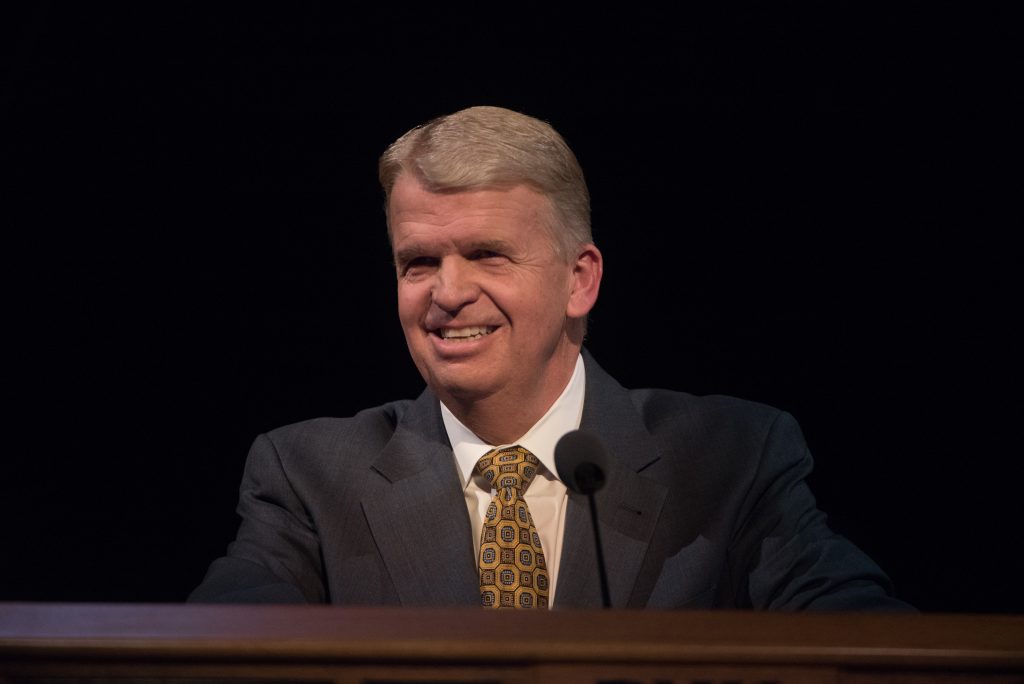
First counselor in the Young Men General Presidency Douglas D. Holmes gave the BYU devotional on Tuesday, Jan. 17. He spoke about how self-understanding comes from truly living the Gospel of Jesus Christ.
Our Identity
Holmes began by reminding listeners they all are children of God, but sometimes they forget what their divine lineage really entails.
“Unfortunately, as with any basic truth that is repeated often, there is a danger that it may become trite,” Holmes stated, “In other words, we say it, hear it, and sing it so frequently, that we may not give much thought to what it actually means to be a child of God.”
Only by better understanding the nature of God can they truly understand who we are as children of God. To understand, they must follow the way Christ left behind, according to Holmes.
The Path to Discipleship
Holmes emphasized the Gospel of Christ, which includes: faith, repentance, baptism, receiving the gift of the Holy Ghost and enduring to the end.
“The path is both beautifully simple and yet profoundly deep. The very simplicity of the path and our assumed sophistication can lead us to look beyond the mark as Nephi’s people did when he masterfully taught this doctrine,” Holmes said.
Holmes noted how faith leads to all the other steps in the gospel. Quoting King Benjamin from the Book of Mormon, he stated that faith is what delivered the Nephites from hopelessness and filled them with joy.
“Static” or passive faith was not consistent with gospel teachings, Holmes warned.
“We must recognize that faith in Christ is not static but can grow into exceeding and even perfect faith,” he stated. “Brothers and sisters, we must believe and we must believe more than we do now.”
Holmes added how faith quickly leads to repentance in the lives of those who wish to be obedient to the teachings of Christ. Though repentance can be due to serious transgression, it should be more often used to change “the small and simple things” that are “not pleasing” in God’s sight.
Holmes recalled a quote by Hugh Nibley, impressing the importance of constant repentance.
“Who is righteous? Anyone who is repenting. No matter how bad he has been, if he is repenting, he is a righteous man. There is hope for him. And no matter how good he has been all his life, if he is not repenting, he is a wicked man,” Holmes read.
He added how repentance is only completed when covenants are made with God through ordinances of the gospel. Ordinances such as baptism and the sacrament are a “deed for word.”
Holmes stressed the importance of the weekly observance of the sacrament.
“In the sacrament, we are also reminded that becoming like Christ is a step by step process, little by little, week by week, we are transformed,” Holmes said.
He then spoke about how ordinances unlocked greater access to the Holy Ghost. The Holy Ghost imparts the fruits and gifts of the Spirit, with the chief among them being charity, the perfect love of Christ.
Touching on the topic of enduring to the end, Holmes compared endurance to a spiral staircase with each step leading to the Lord.
“This image gives me hope and perspective that I can make the journey to come unto Christ by diligently applying His doctrine in my life,” Holmes said. “Step by step and degree by degree, I can continue in the course of the Lord, His eternal round, and His grace can carry me upward.”
He then spoke about the importance of using the “word of God” constantly throughout the journey in order to grow in faith and repeat the cycle of enduring to the end.
Holmes recalled the words of Elder Richard G. Scott, who explained how feasting on the word of God should never take a backseat to “sleep, school, work, television shows, video games, or social media.”
Holmes concluded by inviting the listeners to reevaluate their goals and focus on the path of discipleship.




